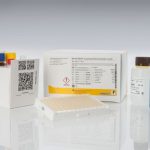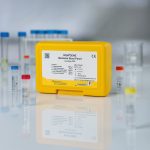Intended use:
For in vitro diagnostic use. RIDA®GENE Hospital Stool Panel is a real-time multiplex RT-PCR for the direct, qualitative detection and differentiation of norovirus (genogroup I and II), rotavirus and Clostridium difficile toxin-genes A (tcdA) / B (tcdB) in human stool samples. RIDA®GENE Hospital Stool Panel real-time multiplex RT-PCR is intended for use as an aid in diagnosis of a hospital-acquired gastroenteritis.
General information:
Hospital acquired or nosocomial diarrhea is defined as an acute episode of diarrhea after 72 hours of hospitalization (3-day rule). The causes of hospital acquired diarrhea may be infectious or non-infectious (e.g. medication or chemotherapy) and affects up to one third of hospitalized patients. Hospital acquired diarrhea can cause serious complications in patients and increases length and costs of hospital stay.
The most common infective cause of hospital acquired diarrhea is Clostridioides difficile. However, Clostridioides difficile infection is also seen in an increasing number of non-antibiotics-treated and non-hospitalized individuals. The symptoms range from mild diarrhea to intestinal infections of variable severity, including pseudomembranous colitis, the most severe form of antibiotics-induced inflammatory bowel disease. Clinically symptomatic cases are caused by toxigenic Clostridioides difficile strains that produce toxin A and toxin B. In recent years the incidence and severity of Clostridioides difficile infections increased worldwide.
Apart from Clostridioides difficile other predominant infectious causes are norovirus and rotavirus. Noroviruses cause by far the most cases of non-bacterial gastroenteritis outbreaks. A gastroenteritis caused by norovirus is manifested by severe nausea, vomiting and diarrhea. Noroviruses are egested by stool and with the vomit. An airborne transmission through aerosols containing the virus is often the cause of a very rapid spreading in shared facilities. The Center for Disease Control (CDC, Atlanta, USA) estimates that more than 21 million cases of acute gastroenteritis, 70,000 hospitalisations and 800 deaths are caused by norovirus infections each year in the United States.
Rotavirus is the main cause of diarrhea in children aged under five and is responsible for the death of an estimated 611,000 children worldwide each year. Symptoms of rotavirus infection are usually vomiting, watery diarrhea and abdominal pain. The virus is transmitted by the faecal-oral route through contaminated hands and objects.
Real-time RT-PCR permits a rapid, highly sensitive and specific detection of the infectious cause of diarrhea. An early and reliable diagnosis of the diarrhea causing pathogen makes it possible to administer specific treatment of hospitalized patients and also to initiate hygiene measures to prevent nosocomial transmission.
Advantages
- Reliable detection and differentiation of most common viral diarrheal pathogens, norovirus and rotavirus as well as the important bacterial diarrheal pathogen Clostridioides difficile
- Ready-to use reagents
- Harmonized Workflow and PCR profile allows parallel processing of multiple RIDA®GENE assays (DNA and RNA assays)
- PCR results in less than 1.5 hours
- All necessary controls included (Internal Control, Positive Control and No Template Control)
- Simplified sample analysis through RIDA®SEEK Software
Accessories:
| Art. No. | PG0705 |
|---|---|
| Test format | 100 reactions |
Dear customers,
we have started to provide the documents for our products in an electronic format. These are the Instructions for Use (IFU), the Safety Data Sheets (SDS) and the Certificate of Analysis (CoA). For batches placed on the market after 01 January 2023, you can find our documents on the eIFU portal eifu.r-biopharm.com.










